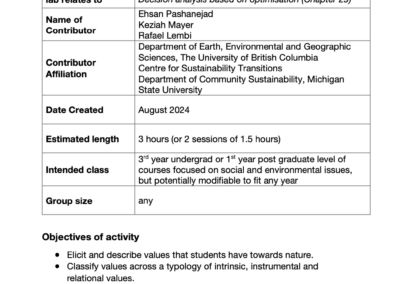This page deals with the set of methods related to decision analysis based on optimisation, which refers to a systematic approach to evaluating information about alternative choices when multiple options are possible, with many possible outcomes and different trade-offs. The content on this page discusses mathematical programming, optimal control theory, game theory, decision theory, cost-benefit analysis and multiple-criteria decision analysis.
The Chapter summary video gives a brief introduction and summary of this group of methods, what SES problems/questions they are useful for, and key resources needed to conduct the methods. The methods video/s introduce specific methods, including their origin and broad purpose, what SES problems/questions the specific method is useful for, examples of the method in use and key resources needed. The Case Studies demonstrate the method in action in more detail, including an introduction to the context and issue, how the method was used, the outcomes of the process and the challenges of implementing the method. The labs/activities give an example of a teaching activity relating to this group of methods, including the objectives of the activity, resources needed, steps to follow and outcomes/evaluation options.
More details can be found in Chapter 29 of the Routledge Handbook of Research Methods for Social-Ecological Systems.
Chapter summary:
Method Summaries
SRF Pack of Cards
Ocampo-Melgar, A. (2023)
Case Studies
Lab teaching/ activity
Tips and Tricks
- Grass, D., J.P. Caulkins, G. Feichtinger, G. Tragler, and D.A. Behrens. 2008. Optimal Control of Non-linear Processes. Berlin: Springer.
- Schmedders, K., and K.L. Judd. 2014. Handbook of Computational Economics, Volume 3. Amsterdam: Elsevier.
- Seierstad, A., and K. Sydsæter. 1987. Optimal Control Theory with Economic Applications. Amsterdam: North Holland.

